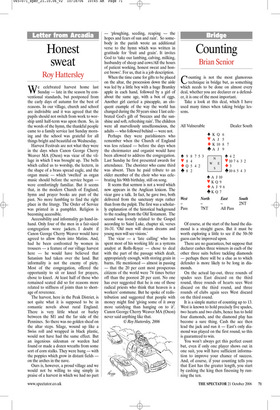Honest sweat
Roy Hattersley
We celebrated harvest home last Sunday — late in the season by conventional standards, but postponed from the early days of autumn for the best of reasons. In our village, church and school are indivisible and it was agreed that the pupils should not switch from work to worship until half-term was upon them. So, in the words of the hymn, the thankful people came to a family service last Sunday morning and the school was grateful for all things bright and beautiful on Wednesday.
Harvest Festivals are not what they were in the days when Canon George Cherry Weaver MA (Oxon) was vicar of the village in which I was brought up. The bells which called us to worship, the lectern, in the shape of a brass spread eagle, and the organ music — which ‘swelled’ as organ music should before the service began were comfortingly familiar. But it seems that, in the modern Church of England, hymn and prayer books are part of the past. No more fumbling to find the right place in the liturgy. The Order of Service was printed in a pamphlet. Religion is becoming accessible.
Accessibility and informality go hand-inhand. Only four of the men in a fair-sized congregation wore jackets. I doubt if Canon George Cherry Weaver would have agreed to allow them into Matins. And, had he been confronted by women in trousers — a feature of our village harvest here — he would have believed that Satanism had taken over the land. But informality is not the enemy of piety. Most of the congregation, offered the opportunity to sit or kneel for prayers, chose to kneel. At least half of those who remained seated did so for reasons more related to stiffness of joints than to shortage of reverence.
The harvest, here in the Peak District, is not quite what it is supposed to be in romantic novels about rural England. There is very little wheat or barley between the M1 and the far side of the Pennines. So there was no golden sheaf on the altar steps. Silage, wound up like a Swiss roll and wrapped in black plastic, would not have had the same effect. But an ingenious sidesman or warden had found or made a dozen wreaths from some sort of corn stalks. They were hung — with the poppies which grow in distant fields on the arches in the nave.
Ours is, however, a proud village and we would not be willing to sing simply in praise of a harvest in which we had no part — ‘ploughing, seeding, reaping — the hopes and fears of sun and rain’. So somebody in the parish wrote an additional verse to the hymn which was written in gratitude for ‘fruit and grain’. It invites God to ‘take our lambing, calving, milking, husbandry of sheep and cows/All the hours of patient working, honest sweat and honest brows’. For us, that is a job description.
When the time came for gifts to be placed on the altar, the procession down the aisle was led by a little boy with a huge Bramley apple in each hand, followed by a girl of about the same age, with a box of eggs. Another girl carried a pineapple, an eloquent example of the way the world has changed during the 50 years since I last celebrated God’s gift of ‘breezes and the sunshine and soft, refreshing rain’. The children were all marvellously unselfconscious, the adults — who followed behind — were not.
Perhaps they were parishioners who remember when the Church of England was less relaxed — before the days when the choirmaster and organist would have been allowed to address the congregation. Last Sunday he first presented awards for attendance. The chorister who came third was absent. Then he paid tribute to an older member of the choir who was celebrating his 90th birthday, still on song.
It seems that sermon is not a word which now appears in the Anglican lexicon. The vicar gave a talk. In fact, he gave two, both delivered from the sanctuary steps rather than from the pulpit. The first was a scholarly explanation of the historical background to the reading from the Old Testament. The second was loosely related to the Gospel according to Saint Luke, chapter xii, verses 16–31. ‘Old men will dream dreams and young men will see visions.’ The vicar — a ‘late calling’ who has spent most of his working life as a systems analyst at Rolls-Royce — chose to deal with the part of the passage which dealt, appropriately enough, with storing grain in barns. He mentioned — almost in passing — that the 20 per cent most prosperous citizens of the world were 74 times better off than the poorest 20 per cent. No one has ever suggested that he is one of those radical priests who think that heaven is a workers’ commune. But he spoke of redistribution and suggested that people with money might find ‘giving some of it away more satisfying than hanging on to it’. Canon George Cherry Weaver MA (Oxon) never said anything like that.


































































































 Previous page
Previous page